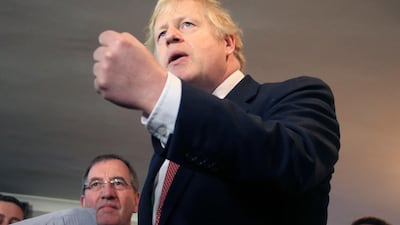UK Prime Minister Boris Johnson seeks to take Britain out of the EU by January 31 before agreeing on a new trade deal with the bloc by the end of next year, a senior Conservative said on Sunday.
Mr Johnson’s Conservatives won a sweeping victory in a general election on Friday with a majority of 80 seats, the party’s biggest election win for three decades.
In his victory speech, he acknowledging some of the traditional Labour voters the Conservatives won in the north of England, saying he was grateful for their support and would lead “a people’s government”.
Mr Johnson is due to set out his plan for Brexit in a Queen’s Speech on Thursday.
He is due to carry out a Cabinet reshuffle in February where he is expected to wean out several ministers.
Mr Johnson intends to replace some civil servants with external experts to try to reshape the country’s economy, in what will probably be a radical reformation of government.
“I can absolutely confirm that we will have an opportunity to vote on the Withdrawal Agreement Bill in relatively short order and then we will make sure that it passes before January 31,” Cabinet Office Minister Michael Gove told Sky News on Sunday.
Of the new trade deal with the EU, Mr Gove said: “It will be concluded next year.
"We will be in a position to leave the EU before January 31 next year and then we will have concluded our conversations with the EU about the new framework of free trade and friendly co-operation that we will have with them by the end of next year.”
But Michel Barnier, the EU’s head of negotiations with the UK, has been sceptical about the talks concluding within the 11 months set by Mr Johnson.
Mr Gove also ruled out another Scottish independence referendum, despite the election success of Nicola Sturgeon’s Scottish National Party, whose policies include another vote on the matter.
The SNP increased its share of the vote on Friday and raised its number of MPs to 47, cutting the number of Conservative MPs in Scotland from 13 to six.
"We were told in 2014 that would be a choice for a generation," Mr Gove said. "We are not going to have an independence referendum on Scotland.”
Earlier on Sunday, Labour party leader Jeremy Corbyn in two newspapers apologised to supporters, saying he would resign as soon as a new leader was elected by party members.
The Labour leadership election is set to begin on January 7, with a replacement for Mr Corbyn expected to come into power in March.
Rebecca Long-Bailey, a long-time ally of Mr Corbyn, and his shadow chancellor John McDonnell are tipped to be the favourites.
Keir Starmer, the shadow Brexit secretary, is also considered to be a front-runner for the job, but many MPs would like to see a female lead the party for the first time in its 119-year history.
Former shadow secretary of state for energy and climate change, Lisa Nandy, said on Sunday that she was “strongly considering” running.
Others considering throwing their hats into the ring include Jess Phillips, Angela Rayner, Yvette Cooper and Emily Thornberry.

